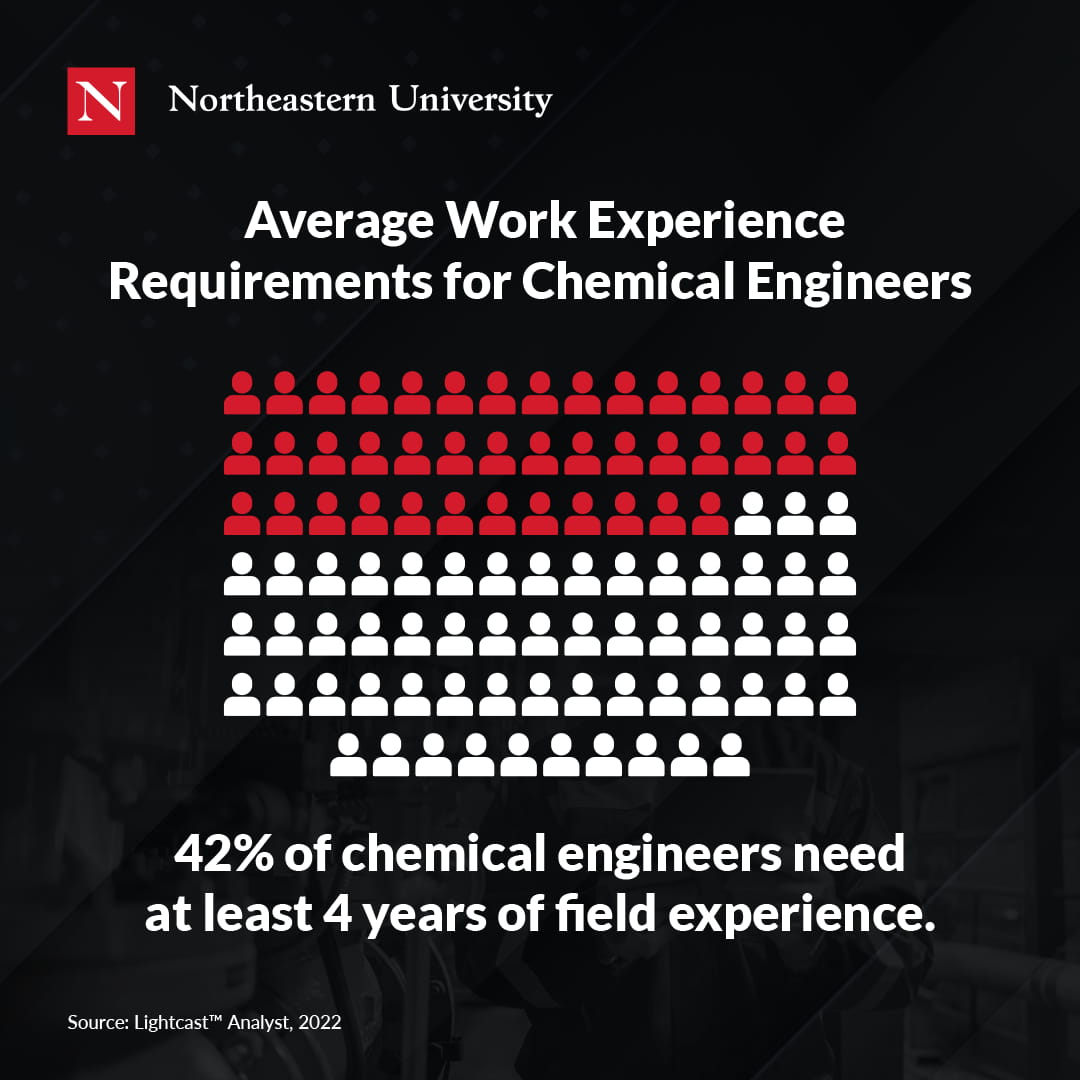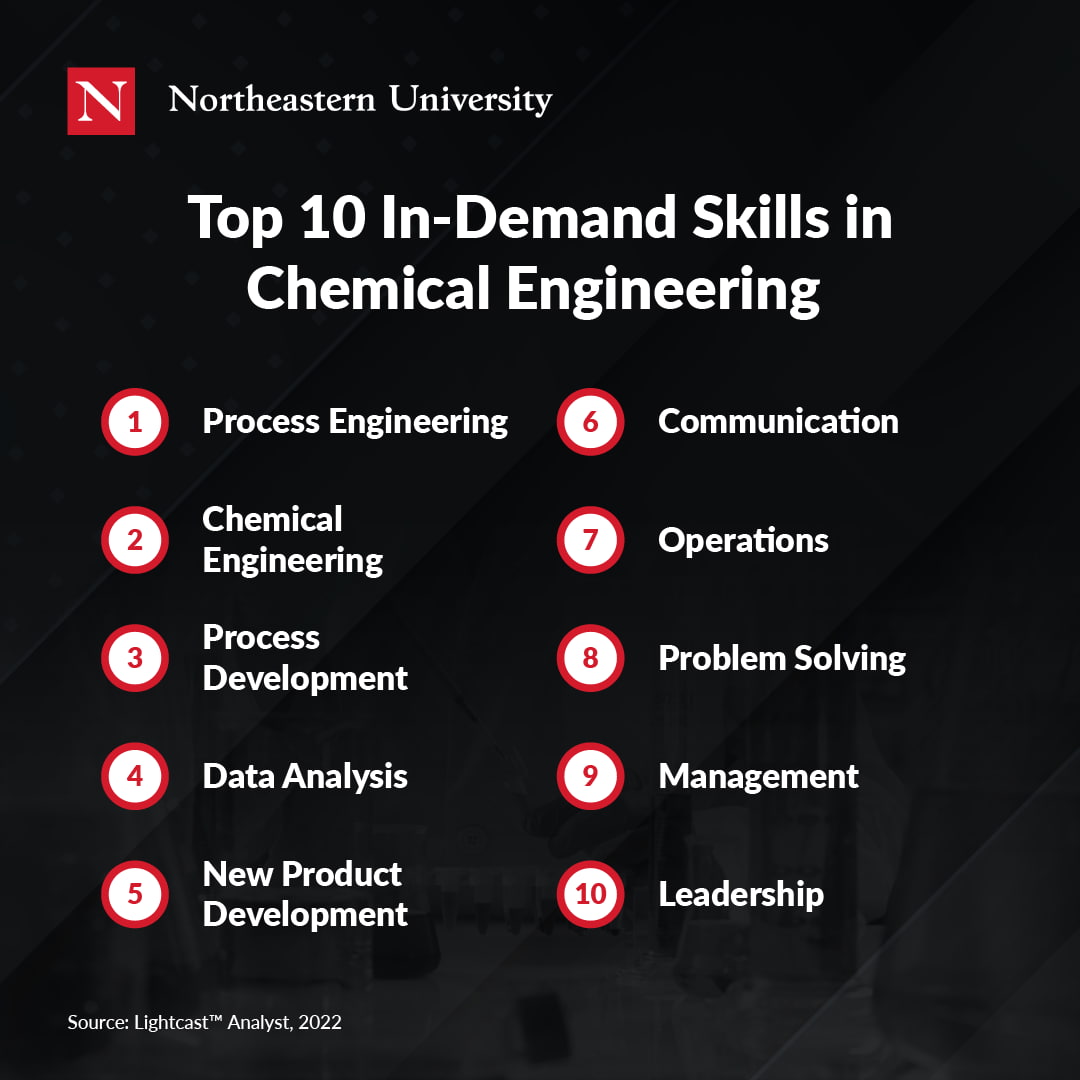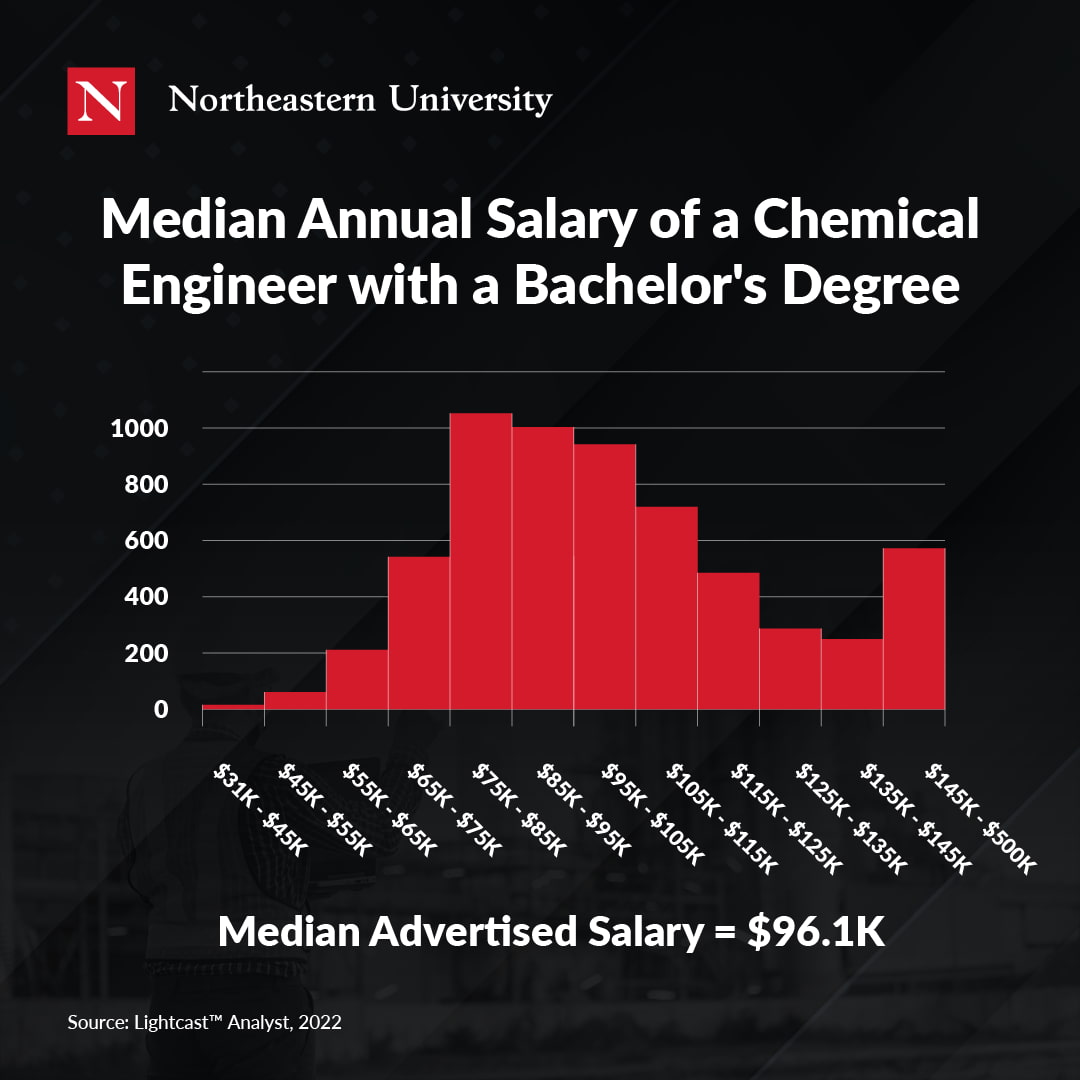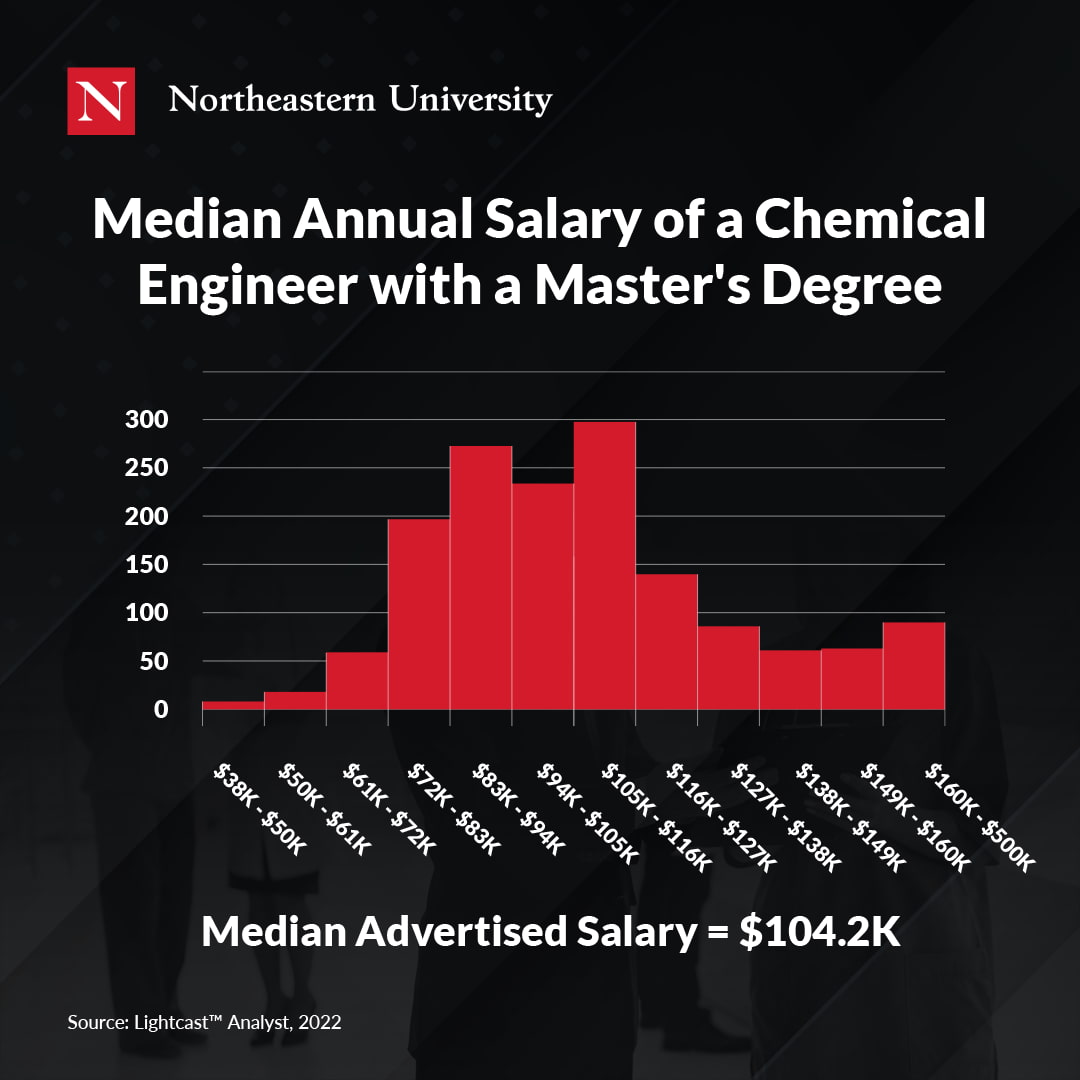Making the decision to advance your education is never easy. Whether you’re a working parent, career changer, or working professional, there are a number of perceived obstacles that can deter you from taking the next step in your career. However, those interested in chemical engineering need to consider earning a master’s degree if they hope to advance their career in this exciting field.
Here’s an overview of chemical engineering, various careers you can expect in the field, a snapshot of a chemical engineering curriculum, and the four main reasons you should obtain a master’s degree.
What Is Chemical Engineering?
Chemical engineering is a subset of engineering that focuses on the safe and economical production and manufacturing of products through chemical processes. Professionals in the field translate these methods into practical applications like designing equipment, facilities, and systems for highly technical processes.
These processes include refining raw materials and processing chemicals. Chemical engineers also strive to enhance the sustainability of these processes and value products, relying on foundational engineering knowledge of mathematics, physics, and chemistry.
Careers in Chemical Engineering
There are numerous career paths available to professionals with a chemical engineering degree. Some of these job titles include:
- Chemical Engineer: As one of the most commonly known careers that require a chemical engineering degree, chemical engineers design and oversee the production of chemicals, fuels, foods, pharmaceuticals, cosmetics, and biological products in chemical manufacturing processes. While most chemical engineers are employed by large-scale manufacturing plants, many also enjoy career opportunities in fields such as biotechnology, personal care products, and electronic device fabrication.
- Plant Process Engineer: Plant process engineers design manufacturing plants that safely transform raw materials into consumer products or other discrete materials. In order to create optimal designs, these engineers work closely with high-level personnel at manufacturing plants to meet the facilities every need. As project managers of the plant design process, plant process engineers work exclusively in large-scale manufacturing plants.
- Process Design Engineer: Process engineers primarily help businesses create systems and processes to optimize various organizational resources, such as mechanical equipment, raw materials, and energy sources. While process design engineers are always striving to improve a company’s processes, they focus on maintaining production efficiency and reducing overall expenses. Process design engineers can work in many industries, including chemical, manufacturing, and food production.
Chemical Engineering Curriculum
Chemical engineering offers vast career opportunities for professionals looking to address the planet’s pressing challenges and a foundational education is essential for all prospective chemical engineering professionals. Those looking to earn an education in chemical engineering can expect courses like:
- Chemical Engineering Mathematics
- Chemical Engineering Kinetics
- Statistical Thermodynamics
- Design of Experiments and Ethical Research
Individuals who don’t have a bachelor’s degree in engineering or a related field shouldn’t be discouraged from pursuing a master’s degree in chemical engineering. Many master’s programs allow those without a bachelor’s degree to apply, providing they complete supplementary undergraduate coursework to ensure they have the foundational knowledge to excel in master-level classes.
These educational programs allow students to develop an understanding of the foundational principles of chemical engineering while also offering career experience through various research opportunities. Earning an advanced degree in this field is extremely beneficial for anyone who is serious about a chemical engineering career.
Reasons You Should Earn a Master’s Degree in Chemical Engineering
There are many reasons why you should consider advancing your education, but the benefits vary between industries. Here’s an overview of the four reasons you should consider earning a master’s degree in chemical engineering.
1. Increase Your Earning Potential
Many working professionals pursue advanced education for financial reasons. Whether you’re looking for higher earning potential or greater job stability, a master’s degree in chemical engineering can help.
According to job posting data, chemical engineers with a bachelor’s degree earn a median annual salary of $96,100.
Comparatively, chemical engineers with a master’s degree earn a median annual salary of $104,200. This increase in annual earnings ensures a rewarding return on your education investment.
2. Gain Work Experience Opportunities
Employers hiring chemical engineers value applicable work experience; however, this can be a common obstacle for many applicants who need that first job to break into the field. For example, job posting data shows that the average work experience requirement for chemical engineers is between three and six years. For professionals just beginning their careers, these experience requirements can prevent them from landing many attractive positions.

Master’s programs, like the one offered at Northeastern University, address this challenge by creating a curriculum that’s both experiential and relevant to today’s work environment.
Northeastern students can participate in the signature cooperative education program, gaining up to eight months of professional work experience in their area of interest. With a premier location in downtown Boston, a hub of biotech, academia, and renowned medical and pharmaceutical institutions, this program leverages the wealth of collaborations with neighboring universities, hospitals, and medical centers. Students help solve real-world challenges for these employer partners while receiving mentorship from industry leaders.
If you’re worried that your existing work experience isn’t going to cut it, an experiential master’s degree is a great way to bulk up your resumé.
3. Develop In-Demand Industry Skills
Since chemical engineering is a highly specialized industry, many professionals in the field need a number of technical skills to succeed. According to job posting data, some of the most in-demand technical skills that employers want on your resumé are:
- Process Engineering
- Chemical Engineering
- Process Development
- Data Analysis
- New Product Development
While technical skills are incredibly important to employers, softer skills are also highly valuable for professionals looking to take on leadership roles in chemical engineering. According to the same data, the most in-demand “common” skills that many employers require in higher earning roles are:
- Communication
- Operations
- Problem-Solving
- Management
- Leadership

A master’s in chemical engineering can help you obtain and develop these core competencies to prepare you for any industry challenge. Keep in mind that no two programs are alike. Find a master’s program that focuses on developing these key skills to ensure you are a highly marketable applicant post-graduation.
4. Expand Your Professional Networks
You’ve heard it before: It’s not what you know; it’s who you know. While having in-demand skills and foundational knowledge is critical to your success, networking is another essential part of your job search. According to LinkedIn, around 80 percent of professionals cited networking as a vital component of their career success.
While undergraduate institutions offer resources like an alumni network, graduate program professional networking is far more beneficial to your career aspirations. For example, Northeastern University’s NUSource is a strong, global network that can catalyze success. These professional relationships can offer career advice, industry insights, and sustained mentorship. When leveraged properly, your master’s program network can be a vital resource for exploring new business prospects, learning opportunities, and more.
Take Your First Step Toward a Career in Chemical Engineering
Take the first step toward an exciting new career in chemical engineering by finding the right master’s program that meets your personal and professional needs. Northeastern University’s Master of Science in Chemical Engineering program offers students extensive opportunities in the Boston area, flexibility to pursue a research- or course-based degree at their desired pace, excellent co-op placement, and over 15 graduate certificates that help develop various specializations in your area of personal interest.
No matter what program you choose, a master’s degree can take your career to the next level.
Ready to take the next step in your chemical engineering career? Check out our Master of Science in Chemical Engineering or connect with an admissions counselor today to find out if it’s the right program for you.








Related Articles
11 Data Science Careers Shaping Our Future
How Data Science is Disrupting Supply Chain Management
What Does a Data Scientist Do?